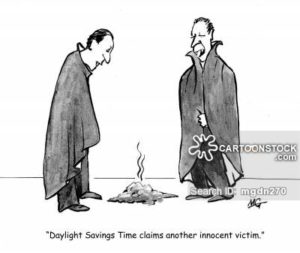To miss a train or business deal,
Because our clocks are without keel
Can cause a nation loss of gold
E’en worse than all the misers hold.
— 1942 letter to Time magazine urging a national daylight savings time
One of the few undeniable benefits of living in the digital era is not having to walk through your home, manually turning back or twisting forward by an hour all of your clocks and watches. Smartphones, computers and even DVRs automatically align with society’s circadian rhythm , as dictated by the nation’s Daylight Savings Time law.
Yes, it’s a law, signed in 1964 by Lyndon Johnson.
But we’ve been screwing with clocks long before then. Sunday morning will mark exactly the 100th time the U.S. has either sprung forward or fallen back. Indeed, we’ve been doing it for so long we’ve forgotten why we did it in the first place — or why we continue to do it.
Daylight savings was initially a wartime maneuver. Germany was the first country to implement it, calculating that the Weimer Republic would save thousands in electricity costs by maximizing daylight hours. Turns out, despite schoolyard legend, that it wasn’t because of stupid farmers.
In fact, farmers hated the change. It meant that, for half a year, they had to get up earlier to bring milk and harvested crops to market. Hollywood hated it, too, reasoning that people were less likely to go into a darkened theater while the sun was shining.
But Uncle Sam would have none of it. If Germany could figure out a military advantage using only a pocket watch, surely we could too. And it didn’t hurt that some institutions — like Major League Baseball, which had not yet invented stadium lighting — tacitly lobbied Congress to institute the shift.
Never mind the grim statistics that come as surely as a beach tide during daylight savings. The National Highway Traffic Safety Administration says that accidents spike fractionally twice a year — the weekend and first week of daylight savings — due to fatigue and drowsy driving.
And there’s no evidence supporting an energy savings. When Indiana adopted the law (you can opt out as a state, though only Arizona and Hawaii have done so), electricity use actually rose 1%. Small, but with a population of 6.5 million, significant.
Still, don’t expect anything resembling change. After all, this is a Congress that still supports an electoral college, though I challenge a single lawmaker to explain why it still exists.
So for now, we’ll just have to get used to it. And, as a public service, remember to adjust your clocks at 2 a.m. Sunday. Remember, it’s the law.
Speaking of which, how about at least an amendment to the bill? Instead of messing with the time-space continuum at 2 a.m. on a Sunday, why not have spring’s leap forward at 4 p.m. Friday? And its fall backward at 9 a.m. Monday? You know, so we can at least spend a couple hours less in a cubicle.
That would at least keep us clearer-headed on Tuesday’s election day.
Speaking of which (encore); ever wonder why our presidential elections are held on a Tuesday? Congress chose the day because voting booths were once rare and separated by hundreds of miles. Many voters had to spend Monday simply traveling to make it to the polls in time. And we’ve never modernized.
Stupid farmers.



